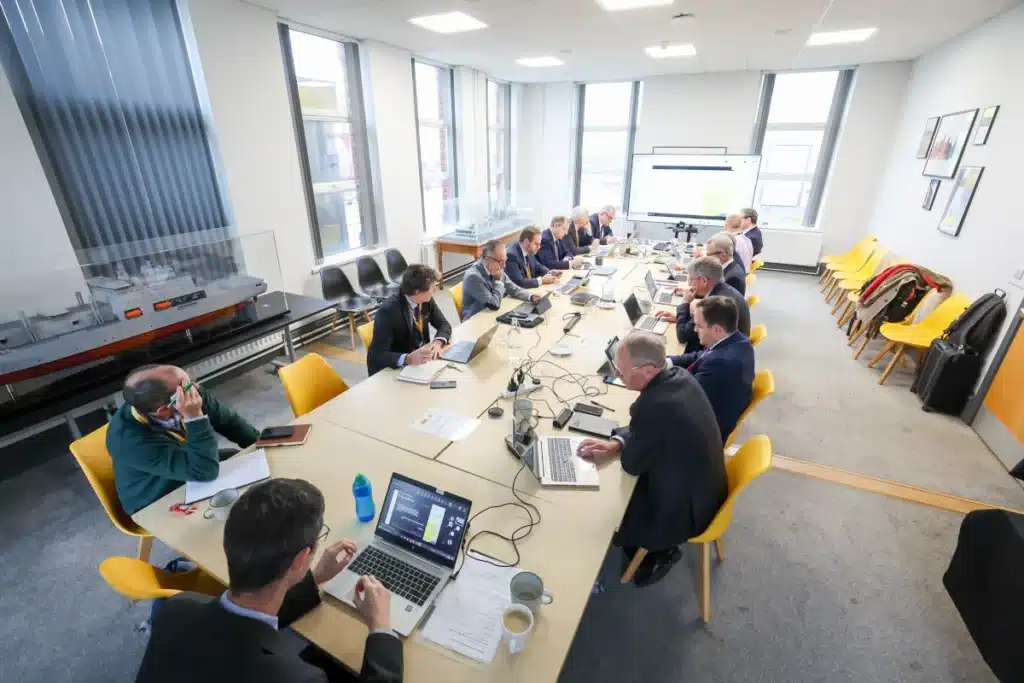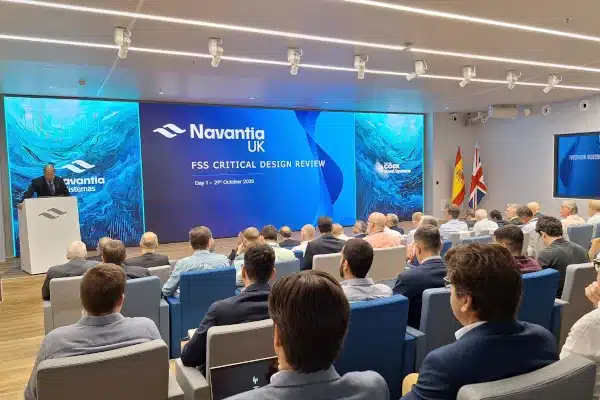The Fleet Solid Support (FSS) programme has achieved a pivotal milestone with the successful completion of the Critical Design Review (CDR), marking the transition from design to manufacturing for the Royal Fleet Auxiliary’s (RFA) next-generation support ships.
The CDR, an essential stage in the shipbuilding process, provides the green light to begin physical production of the three FSS ships. This comprehensive UK Ministry of Defence (MoD) review assessed the complete, detailed design of the vessels, from hull structure to equipment fit. The Review covered overall structural integrity, safety standards, environmental sustainability, risk minimisation and military systems integration.
The successful CDR follows October 2024’s Preliminary Design Review and was marked in both Belfast (Northern Ireland) and Cádiz (Spain), where UK technical teams have been participating in a knowledge transfer programme. This programme enables British teams to work alongside their Spanish counterparts, learning advanced shipbuilding techniques and processes that will be implemented in the UK yards.
The three FSS vessels will be the RFA’s modern solid stores replenishment ships. These ships will deliver vital supplies, munitions and provisions to RN warships while at sea, enhancing the UK’s carrier strike capability and supporting maritime security operations worldwide. The FSS programme represents a dual strategic objective: delivering critical operational capability through three next generation support ships whilst simultaneously rebuilding sovereign UK shipbuilding capacity through the modernisation of UK yards, technology transfer to Navantia UK from the Navantia SA’s Spanish shipyards and workforce development.

Keith Bethell, DE&S director, maritime environment, visited the Harland & Wolff shipyard to mark the CDR milestone and witness the ongoing transformation of the Belfast facility. He commented: “I was impressed by the scale of transformation underway in Belfast, seeing firsthand how we will deliver this world-class capability and meeting individuals central to the programme. This important CDR milestone brings us closer to ensuring the RFA can support our naval operations worldwide, whilst strengthening sovereign shipbuilding for years to come.”
The three ships being built for the RFA under the FSS programme will deliver vital supplies to Royal Navy (RN) warships. Each ship is 216m long – the length of two Premier League pitches. They will be the largest UK military ships with the exception of aircraft carriers.
Donato Martínez, the CEO of Navantia UK, commented: “CDR confirms the hard work and collaboration between MoD, BMT and Navantia UK. This milestone demonstrates that the programme is ready to meet its operational, logistical and efficiency needs as it gears up to deliver for the RN and RFA.”
Ian Randles, the FSS chief engineer at the MoD said: “Completing the CDR represents a significant achievement for the FSS programme and demonstrates the strong partnership between DE&S, Navantia UK and BMT. This milestone gives us confidence that we are on track to deliver these vital support ships that will enhance the RFA’s global reach and ensure our naval forces have the logistical support they need wherever they operate. We are now ready to move forward with cutting steel and beginning construction of these advanced vessels.“
BMT has leveraged its expertise in commercial and naval design, along with its knowledge of clean maritime, to deliver the functional design for the FSS ships. This design is adaptable to counter evolving global threats and integrates energy-saving technologies, future fuel flexibility, and emission-reduction systems to support the RN’s Net Zero 2050 objectives. Looking ahead, BMT will continue advising on design evolution, develop through-life support and training packages and lead safety, environmental and security accreditation through to vessel acceptance.
Catriona Savage, BMT’s FSS programme director, said: „We are proud to have collaborated with Navantia UK and MoD to provide a safe, secure, environmentally-conscious, adaptable design, ensuring that the detailed engineering reflects the functional design intent as the programme transitions to production.”
As a Sunday Times Top 100 UK apprenticeships employer, Navantia UK is committed to developing the next generation of shipbuilders. The company recently welcomed 73 new apprentices across its four sites, bringing the current number of apprentices to 222. Navantia UK plans to create 500 additional apprenticeships by 2030, demonstrating its long-term commitment to building the UK’s future shipbuilding workforce.


